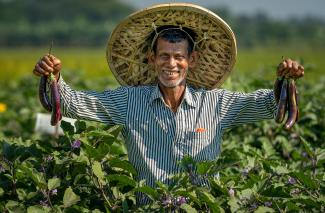Bangladesh is one of the most densely populated countries in the world, with a population of over 170 million, and is projected to grow to over 200 million by 2050. This demographic burden places tremendous economic, social, and environmental strain on the country and dramatically affects its ability to provide for its citizens. Bangladesh has one of the largest Feed the Future portfolios in the world with an annual budget of approximately $40 million. The U.S. Government’s Feed the Future activities in Bangladesh – led by USAID – invest in inclusive and sustainable agricultural-led economic growth, strengthen resilience, and help ensure a well-nourished population, especially for women and children.
Through Feed the Future programs, USAID investments benefit over one million people each year – helping farmers increase productivity, providing people with more nutritious food options, expanding access to finance and loan opportunities, and enabling individuals and businesses to boost profits. As a result, USAID-supported farmers and agribusinesses generated sales of $1.2 billion in 2023 – more than tripling total combined sales among Feed the Future producers in Bangladesh from the previous year.
Increasing Productivity in Targeted Crops and Goods
USAID trains farmers and commercial producers to adopt new techniques that improve productivity in aquaculture, livestock, horticulture, rice, maize, pulses, oilseeds, flowers, and natural fibers. Our programs connect farmers to buyer-linked value chain actors and farmer services, leading to increased sales opportunities and higher quality produce as well as resulting in greater access to new domestic and international markets.
Improving Diversification, Private Sector Competitiveness and Policy
USAID works closely with the public and private sectors to identify market opportunities and strategies for expanding the production of targeted crops and commodities that have the greatest potential to increase incomes, improve nutrition, and contribute to greater economic empowerment, especially for women. These partnerships also increase job opportunities for the poor away from the farms. In addition, USAID promotes a more business-friendly policy environment, strengthens management and marketing skills among the Bangladeshi workforce, improves quality standards, and increases access to loans and financial services.
Sharpening Focus on Trade
USAID helps the Government of Bangladesh modernize and improve the efficiency of its customs operations to make it easier to do business, increase national competitiveness, and accelerate economic growth. USAID assistance also helps reduce non-tariff barriers to trade, including revising policies, regulations, and procedures. This has helped reduce the average processing time for imports and exports by two full working days, expedited customs declaration processing by nearly 70 percent, and provided traders with real-time information and guidance through a new customs website. In addition, these efforts have saved the government and businesses time and money while facilitating Bangladesh’s graduation from Least Developed Country status by 2026.
Upgrading Infrastructure
USAID investments leverage public-private partnerships to rehabilitate and upgrade infrastructure like local feeder roads and collection centers that enable producers to transport commodities to markets more efficiently. Since 2013, USAID has invested over $27 million to rehabilitate more than 100 kilometers of rural roads and construct 27 agricultural produce collection points and marketplaces. USAID will rehabilitate additional roads and market centers over the next five years, boosting last-mile market connectivity.
Results
- In 2023, USAID projects across horticulture, aquaculture, livestock, and dairy value chains leveraged $20.6 million in private sector investment, and helped expand farmers’ access to quality agriculture inputs to increase productivity.
- Feed the Future programs helped catalyze $11.1 million in additional access to finance in 2023.
- USAID trained 129,000 individuals on improved gardening techniques, enabling 96 percent of female participants to consume a more diverse and nutritious diet. USAID also supported more than 22,000 individuals gain access to safe drinking water and assisted over 65,000 people install sanitary latrines, helping reduce food-borne illness.
- USAID facilitated the research and development of stress-tolerant, high-yielding varieties of crops through biotechnology, resulting in over 40,000 farmers utilizing pest-resistant eggplant varieties and achieving 41 percent higher yields.

